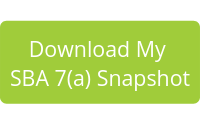Every year, lenders across the country approve approximately $20 billion in U.S. Small Business Administration (SBA) 7(a) loans, making it the most popular and accessible SBA loan program. With flexible requirements and extended repayments terms, the SBA 7(a) loan program is a great fit for small businesses in all stages of growth – from start-ups to established institutions. And as a small business lender, the better your team understands the SBA 7(a) fee structure, loan requirements and prepayment penalties, the better prepared you’ll be to spot potential deals and set realistic client expectations.
This summary provides the information you need to explore alternative financing options when a client falls just outside your conventional lending criteria. Plus, our free, one-page snapshot will help you navigate the SBA landscape and find the best financing options for your small business clients.
Why the SBA 7(a)?
The SBA 7(a) loan program is not only an excellent option for small business borrowers, it’s a consistently viable alternative for the lenders who serve them:
- Lenders can present their clients with a feasible loan option, even when conventional financing may not be available to them.
- Although collateral is required if available, the SBA doesn’t require loans to be fully collateralized, helping more borrowers qualify.
- SBA lenders get a credit enhancement – in the form of an SBA guarantee – for up to 85% of the credit request.
- Lenders gain the added security of SBA guarantees while building small business lending portfolios and their customers’ loyalty.
Basic SBA 7(a) loan requirements
With a $5 million loan maximum, the 7(a) loan program works for most small businesses. It also comes with straightforward requirements. Businesses must be:
- For-profit;
- Physically located and operating in the U.S. or US. Territories;
- Owned and operated by people of good character (as determined by the SBA’s guidelines, and which Prudent Lenders can help its borrowers define), with all relevant management experience;
- Able to repay the loan, determined by an owner’s good credit history and proof that their business will generate enough additional revenue to cover their loan payment.
Eligible 7(a) loan uses
Small business borrowers benefit from the flexibility that the SBA 7(a) loan program offers. Among these approved uses are:
- Expansions, renovations and new construction for commercial properties used for the business or the purchase of real estate;
- Purchases of machinery, equipment and fixtures;
- Leasehold improvements;
- Working capital;
- Refinancing existing business debt;
- Acquisition or expansion of an existing business; and
- Inventory purchases.
Loan maturity
Loans have differing maturities depending on uses. With a goal of enabling borrowers to successfully repay their loans, all SBA 7(a) loans offer flexible terms:
- Up to 10 years or the useful life for equipment, leasehold improvements and business acquisitions;
- Up to 10 years for working capital; and
- Up to 25 years for real estate.
SBA 7(a) fees
SBA 7(a) loans include modest fees that are rolled into the loans. These include:
- An annual, ongoing guarantee fee: This is based on the outstanding amount of guaranteed principal each year and is paid monthly by lender (and can’t be passed on to borrowers).
- A one-time SBA guarantee fee: Lenders pay this within 90 days of a loan’s approval and this fee can be rolled into borrower’ payments.
Prepayment penalties on SBA 7(a) loans
There are no prepayment penalties for SBA 7(a) loans with terms less than 15 years. Borrowers incur a fee, known as the SBA Subsidy Recoupment Fee, when 25% or more of the loan total is paid in any single year during the first three years after the disbursement of the loan. The SBA Subsidy Recoupment Fee is only for loans with terms that exceed 15 years, and while incurring this fee is rare, our team is here to provide guidance should your borrower meet the qualifications.
Download your SBA 7(a) snapshot
The more familiar you are with the SBA loan programs and requirements, the easier it is to identify viable deals. Download this one-page snapshot to reference as you route loan requests to ensure you’re choosing the best loan products for you and your small business customers.
Prudent Lenders helps you minimize the time you spend determining SBA eligibility. Learn more about spotting SBA eligible deals or contact us with questions.


